Educational Board Games for Summer Break
Summer break is finally here! We’ve got your roundup of some great games to help keep the weeks fun and brains sharp all summer long!
With the school year behind them and 12 or so weeks ahead of pure summer bliss, your kids may not be interested in doing anything educational, I know I wasn’t. Yet summer learning loss is a real thing, students can lose a month or more worth of school-year learning during the summer break!
I’m a huge advocate of using summer break as a time to continue kids’ education while still enjoying all the perks of summer in as screen-free of a way as we can. We sign up for all of the summer reading programs in our city and spend as much time as we can outside, exploring and hitting up new parks and splash pads each week.
And on those days that are too hot to get outside, we stay in and play games!
There are so many amazing board games that you can use to help promote learning for players of all ages. We’ve compiled a list of some of our favorites for every scholar, from Pre-K through High School that are sure to keep their brains sharp and the family entertained as well!
Pre-School and Kindergarten
They may not be able to read yet, but there are plenty of games to play that will get your littlest learners gears turning!
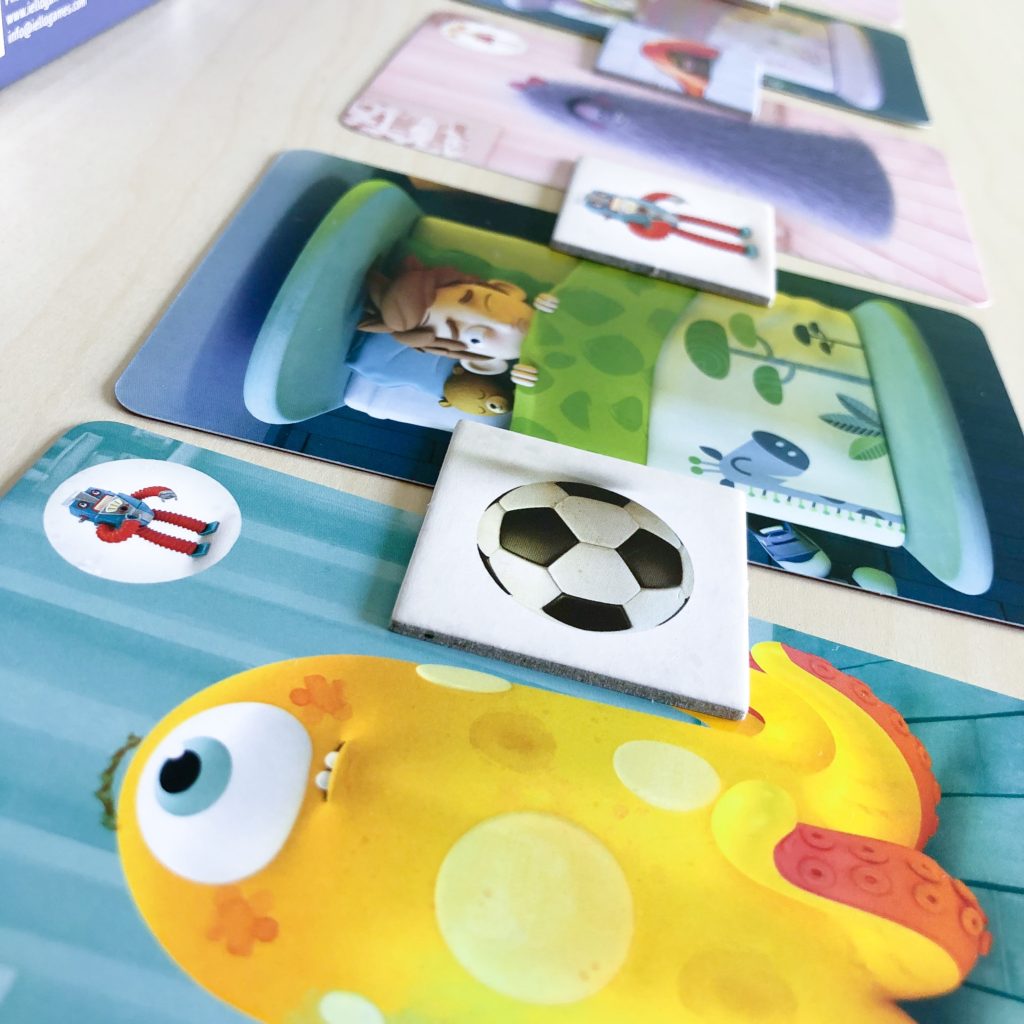
Educational benefits: color matching, shape recognition, simple addition
This new game from HABA is the perfect theme for summer!
Six snails are off on a slippery race through Mrs. Meyer’s vegetable garden with players each secretly trying to get three snails to the finish line first.
You’ll draw cards at the start of the game that lets you know which snails you’ll be trying to get on the podiums. Then players will roll two six sided color dice choosing one dice to represent that color snail, and the other to indicate the color of space they’ve raced ahead to on the board.
Our kids love how the snails race over and on top of each other and the fun, whimsical way they magnetically race up, over, and down the sides of the game tin on their way to the podiums.
Once all three podium spaces are occupied by snails the game is over and players flip over their cards to reveal who won, with players receiving three points for a snail on the first place podium, two for a snail in second, and one for a snail in third.
Educational Benefits: Memory, Matching,
Memory games are a great way to play with your kids while also benefiting their growing minds! There are lots of different and unique games in this category that we talk about in this post. Monster Chase is a new one we’ve recently discovered that has quickly become our three-year-old’s newest favorite.
Monster Chase is an adorable memory game where kids work together to scare away monsters before they all creep out of the closet and surround their bed! Each monster is only afraid of one toy in the bedroom. This toy must be found from the pile of face down toys on the floor. If the kids can scare away all of the monsters before they surround the bed, then they win!
I love that as the game progresses, kids get more and more confident in their ability to remember which tiles they need to flip to reveal the correct toy, giving them a boost of confidence. This is also a fantastic choice if you ever need your young ones to play a game on their own. This can be played by 1 to 5 players and we’ve observed our 3 and 4 year olds each playing this by the rules on their own.
Educational benefits: Critical thinking, observation,
We were thrilled when the kid version of Concept came out! This game is a great choice to help kids work on those critical thinking skills.
In this cooperative game, players will try to get the others to guess an animal by placing their pawn pieces on illustrated icons that best represent the features and characteristics of the animal to be guessed.
Kids will need to not only think critically about how to represent the animal using the available icons, but also need to use their deduction skills as they attempt to decipher the clues being given to them.
This is a fantastic game and perfect for families. And because everything is illustrated, the game is language independent!
Grades 1-4
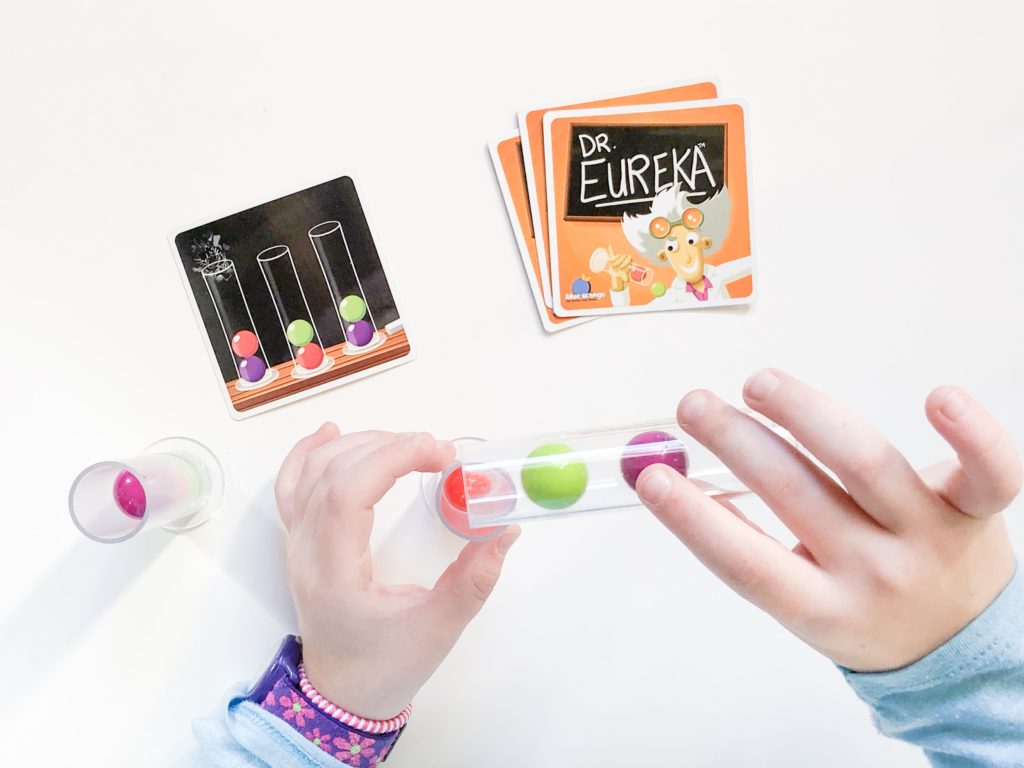
SmartGames
Educational benefits: Problem solving, spatial thinking
The puzzle games from SmartGames are some of our favorite games to pull out, especially during quiet time or when a kid wants to do something on their own.
There are multiple in this line starting with preschool and moving on up. Each box comes with a challenge booklet, a square board, and variously shaped puzzle pieces that the player must fit within the board a specific way.
Start by choosing a challenge from the booklet. Then find a way to fit all of the pieces onto the board so that the challenge conditions are met. This will require players to problem solve, move pieces around, and continue trying different arrangements until they figure out the correct solution.
There are a variety of themes to suit various interests and provide different challenges. We have a few in the series with Penguins on Ice being a favorite for this age.
Blue Orange Games’ Mad Scientist Series
Educational benefits: processing speed, pattern recognition, fine motor skills
The Mad Scientist Series from Blue Orange Games offers three fun and innovative games to play that also help hone brain and fine motor skills for kids.
Whether you’re racing to mix molecules in test tubes to solve scientific formulas in Dr. Eureka; grabbing the correct combination of microbes to place in your petri dish in Dr. Microbe; or arranging molecules into the correct pattern faster than the other scientists in Dr. Beaker, there is lots of fun to be had.
Each game has a racing component which will challenge each scientists’ dexterity and fine motor skills. They also offer fun, challenging puzzles for players to solve as they attempt to transfer, arrange, and organize components into their correct places quickly.
These games are sure to provide lots of fun and laughs while helping keep those scientist’s brains sharp and focused.
Untold: Adventures Await
Educational Benefits: Storytelling, Role playing, creativity
Collaborative storytelling and creativity are the fuel for this game! Untold: Adventures Await is a customizable storytelling game where you use Rory’s Story Cubes (worth their own spot on this list, but we’ve combined them in this awesome game!) to tell a unique and exciting story all in about 60 minutes!
This game is such a fun addition to any summer reading program that your kids might be doing! (And we hope they are!) Allowing kids to immerse themselves in a story of their own making is such a fantastic way to encourage their minds to work in new and exciting ways.
This game will also help them learn about the structure of a story as they work through five distinct scenes, creating a setting, characters, and responding to dilemmas, conflicts, and high stakes as they work towards their story’s conclusion.
Completely unpredictable and endlessly replayable, this is sure to provide hours of fun during the summer!
Grades 5-8
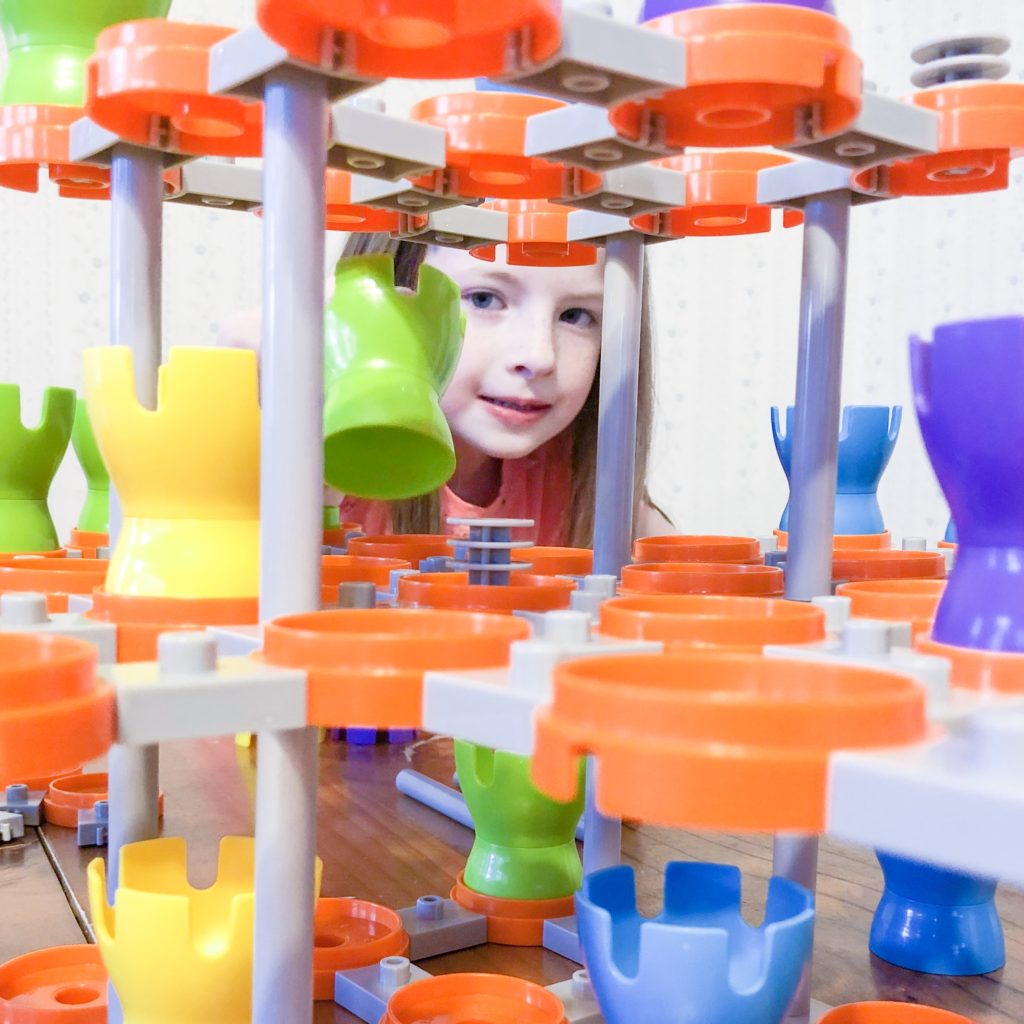
Dragonwood
Educational Benefits: Math, critical thinking, probability
This game is just fun, plain and simple. Our kids love it and we the adults love it too. The fact that there’s a decent amount of math involved to help your kids with their mental addition, subtraction, and probability skills? BONUS!
Read our full review of Dragonwood here!
Dimension
Educational benefits: critical thinking, pattern building, processing speed
If you love the challenge of racing to solve a puzzle before your fellow players, then this game is for you!
Dimension is a 3D spherical, stackable puzzle game where players will be racing to stack their colored spheres in the correct order before the other players.
Task cards will be laid out to indicate how the spheres need to be placed in order to earn points. These cards tell you what you must or must not do. Perhaps you may only use three black spheres, or there can’t be any orange or blue spheres touching. Maybe the white sphere needs to be placed on the top, or there must be more green spheres than orange.
Complete as many of the tasks as you can before the timer runs out. Earn points for based on how many spheres you used and how well you followed each task card.
Gridopolis
Educational Benefits: Players can design their own game!
This is may be the most unique game on this list because it’s not just a game, but a gaming system.
Gridopolis is kind of like a three-dimensional version of chess, checkers, and Chinese checkers all rolled into one. Except, unlike those games, this system is completely customizable, flexible, and modular to allow players to create their own game from the ground up.
As a home educator, this system really impressed me. You can read my full review on why I find Gridopolis to be not only a fun game, but a fantastic STEM tool HERE!
High School and up!
High schoolers are so fun! They’re old enough to play just about anything. For these suggestions, I wanted to focus on games that they can enjoy all summer with their friends and/or family that also provide unique educational undertones through storytelling, reading comprehension, and math.

Pandemic Legacy
Educational Benefit: Storytelling
Pandemic Legacy is the legacy version of the Pandemic game where players cooperatively work together to find cures for diseases. A legacy game is a game with an overarching story where new rules and components will be introduced throughout the duration of the campaign. During the game players will write on cards, rip up cards, put permanent stickers on the board or components, gain new characters, lose characters forever, and much more.
In Pandemic Legacy, a group of players will work together through 12-24 gaming sessions as specialists racing the clock to save the planet from deadly diseases. The game narratively plays out over the course of a year, with each gaming session representing one calendar month. You’ll have two attempts to achieve each month’s objectives with each win or loss impacting the story arc of the game.
Speaking from experience: this game is so fun. And the thrill that comes from ripping that first card…priceless! Due to the nature of the game, you can only play through the story once, but don’t let that worry you! You’ll more than get your money’s worth out of this! It’s a fantastic gaming experience and a really fun way for a group of teenagers to get together to save the world over the summer.
This game currently has two in the series. Season 1 and Season 2. You’ll want to start with Pandemic Legacy: Season 1.
Sherlock Holmes Consulting Detective series
Educational Benefits: Reading Comprehension, Critical thinking, Deduction
Sherlock Holmes Consulting Detective is a game where you’ll analyze and attempt to solve beguiling mysteries by using your wits and powers of deduction. Imagine Choose Your Own Adventure for murder mystery fans!
The game includes 10 cases to be solved. Each case has its own booklet to read from which helps players throughout the game as they decide which location to visit, which witness to question, and where to take their investigation next as they move around Victorian-era London.
This game is anything but Elementary. You will most certainly be challenged in the best way as you work to solve these cases. As consulting detectives you’ll be trying to solve the cases as quickly as Sherlock, which let me tell you, that is waaaay easier said than done. He is the master!
The game creates a unique and satisfying experience as you solve each mystery by logically working through each step, reading new interviews, statements, or scene descriptions. The ability to decide who and where to visit allows for players to truly feel like they are in the thick of a Sherlock episode, looking for the slightest clues hidden in the most mundane of scenes.
It’s not your typical board game. Its driven by storytelling and your ability to work through clues logically and, sometimes, patiently. Depending on how thorough you wish to be, each game can take a couple of hours to complete, but the thrill of piecing the puzzle together and solving the mystery will make that time fly.
Because you’ll be solving the cases, each case can really only be played once by each player since you’ll know how it all went down by the end of the game. However, the unique gaming experience makes it well worth it! Unlike Pandemic Legacy above, you won’t be altering or destroying any aspect of this game, so while you’ll know how the case is solved, you can share it with other friends or family once you’re done!
There are three sets in this series, each with 10 cases. Our favorite is the Jack the Ripper set.
Castles of Mad King Ludwig
Educational benefits: Math, value assessment
For a more traditional board game pick for this age, we’re going with Castles of Mad King Ludwig.
In this tile laying game, you’ll work to build the most extravagant castle for King Ludwigg II room by room.
Players all start with the same foyer. Then, players each take turns being the Master Builder, responsible for setting the prices of the rooms available to be purchased by the other players and then choosing from those rooms leftover for their own castle.
Players will purchase a room from the selection available, priced by the Master Builder. With every room that is added to your castle, you gain points based on that specific room size and type that you added as well as any bonus points you may have earned as well.
After each purchasing round, a new player becomes the Master Builder, now themselves responsible for pricing the rooms. Being the Master builder isn’t always an easy job. You must observe the castles of others and determine which rooms are most valuable to them, and then decide how high you should price those rooms. This is important because when they purchase the room, they’ll be paying you. So if you price too high, they may not be able to afford it, and if you price too low, well, then you don’t have as much money to purchase with during the next turn.
The player with the highest scoring castle at the end of the game is the winner.
There’s a fair amount of math in this game. Yet thanks to the wonderfully easy to interpret iconography and helpful scoreboard, keeping track of the scores isn’t as daunting as it seems. It’s a great game that works in all that quick math for players to have to use without it seeming like homework.
Plus, watching all of the castles form into their zany shapes and sizes is a lot of fun.
If you enjoyed this post, you may also like:
Cardline: Dinosaurs,
3 Unique Memory Games for Kids
Why We Play Board Games
* This post contains affiliate links at no cost to you. To read my full disclosure policy click here.*


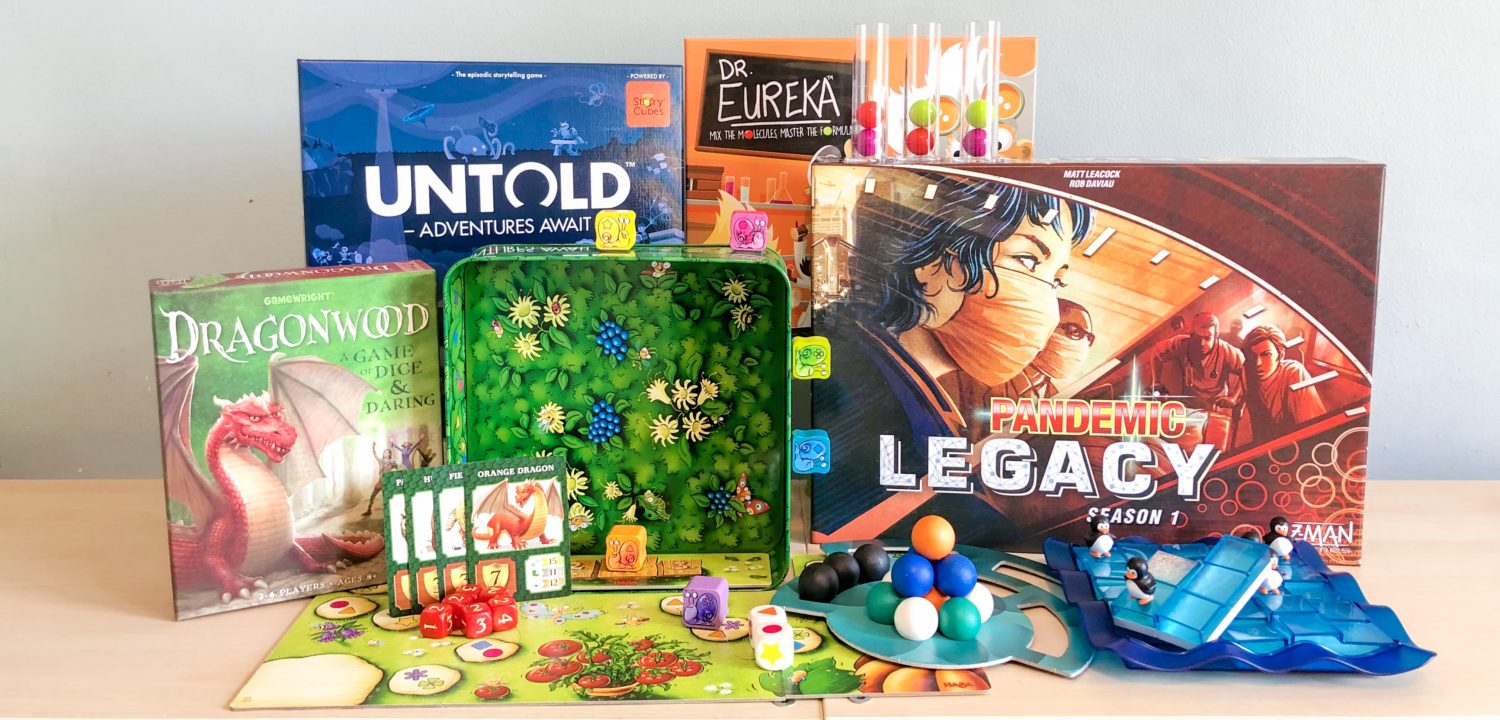
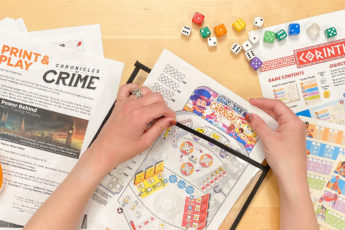
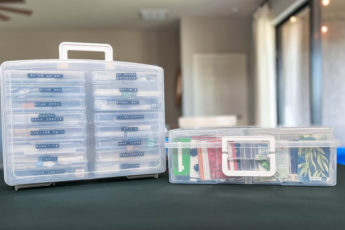






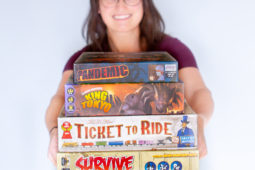
Leave a Comment